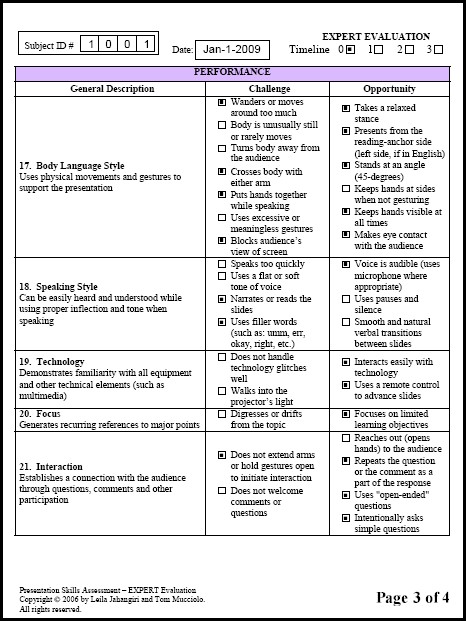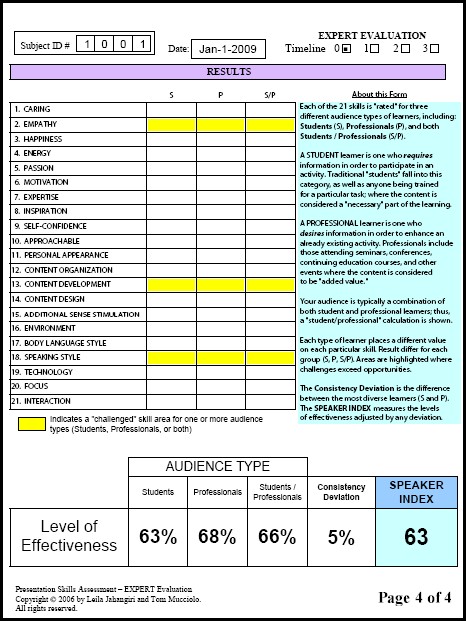

| Skills Assessment An opportunity for evaluation! |
In 2006, in conjunction with New York University, we conducted an extensive research project to identify the skills that contribute to a speaker's effectiveness. From the 2008 published study, we designed a skills evaluation form which measures 80 independent elements to arrive at an effectiveness rating.
In January 2010, the Association of American Medical Colleges (AAMC), through a peer-review process, accepted our Presentation Skills Assessment Tools for online publication on the MedEdPORTAL site, a peer-reviewed publication service and repository for medical and oral health teaching materials, assessment tools, and faculty development resources. The evaluation tools measure levels of effectiveness for STANDARD presentations, where a speaker used visual support; as well as WEBINAR presentations, where a speaker is not seen but uses visual support; and, SPEECH ONLY presentations where a speaker is seen, but does not use visual support.
The MedEdPORTAL site is NOT restricted to medical institutions. Therefore, any individual or organization can register (create an account) and have access to the educational materials. Many of these resources are not specific to medicine, such as our Skills Assessment tools, which are designed measure the level of effectiveness of a presenter (who may be a teacher, trainer, speaker, etc.).
FREE Evaluation...
We are offering an opportunity to evaluate yourself or someone else, using our research-based assessment tool. Just click the link below, fill-out the form, submit it, and you will have an analysis sent back to you, free of charge. It's that simple.
Before clicking the link above and filling-out an assessment, take a look at the sample expert-evaluation form below, taken from one of our Digital Coaching sessions. Selected observations show challenges and opportunities across 21 skill categories. When Digital Coaching is done, a comment area on page two offers suggestions for improvement. However, the area is blank when you submit a self-evaluation or an evaluation for someone else. Page 4 highlights (in yellow) areas of concern where challenges exceed opportunities. Ratings for different audiences are shown, along with a SPEAKER INDEX.




The sample above shows a speaker who has several "challenges" to overcome and many opportunities still to take. There is a degree of inconsistency across audience types. Based on this evaluation, the speaker is using skills more geared to the "professional learner" and will be more effective in front of groups seeking general concepts, rather than those needing to learn a process. In comparative terms, this speaker would better delivering a marketing presentation than conducting a training session.
The overall speaker index indicates there some additional skills are needed to maximize the potential. Keep in mind that this is only the first evaluation (Timeline 0), without the speaker knowing the individual skill areas that need improvement. For development purposes, a realistic target for this speaker would be an index of about 75, with no more than a 3% deviation, representing about a 20% increase in effectiveness.
Effective speakers usually have a Speaker Index of 70 or higher, with a deviation of no more than 5%. These are speakers who have very few challenges and take advantage of most opportunities, with little or no deviation across audience types.
A Note about Audience Types
From a learning perspective, the research identifies
diverse audience
types described as: STUDENTS and PROFESSIONALS. When
comparing groups of students with groups of professionals, the findings indicate
that each group places significance differently on each skill category.
The above assessment accounts for these different perspectives and separates
audiences into three
groups of learners: Students, Professionals and a combination of both.
A STUDENT learner is defined as one who requires knowledge in
order to participate in a desired activity. This group not only includes
traditional “students”, but it is extended to also include residents, trainees,
and anyone who needs to immediately apply learned concepts. So the term
“student” is used in this assessment.
A professional is also a “learner” but in a slightly different sense.
A PROFESSIONAL learner is defined as one who desires knowledge in
order to add to an existing activity. Professionals include those who
incorporate learned concepts over a period of time. Like students, they are
learning, but they are using the knowledge to augment an existing practice or
job function over a longer period.
In many cases, an audience can be a mix of both student learners and professional learners, and this
combination is basically an “average” of the two groups.
Home | About | Contents | Seminars | Stuff | Pricing | What's New | Links | Clips